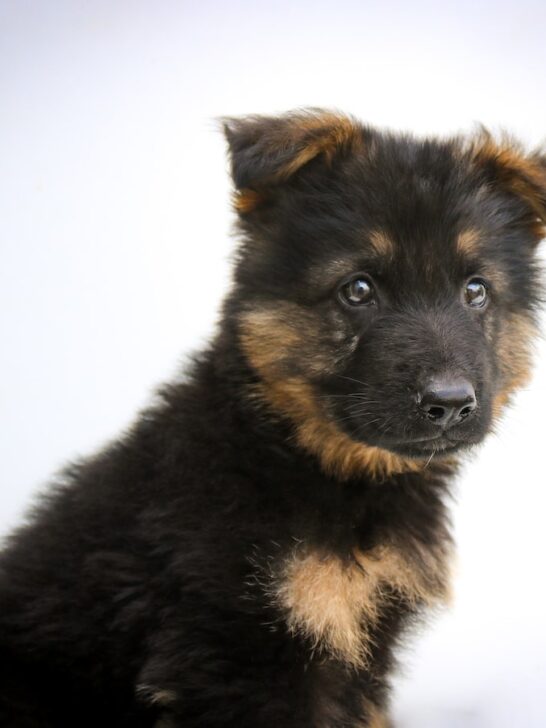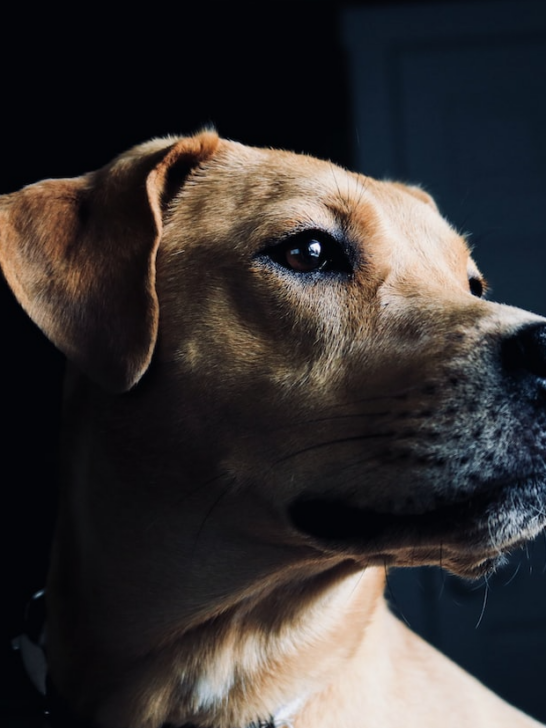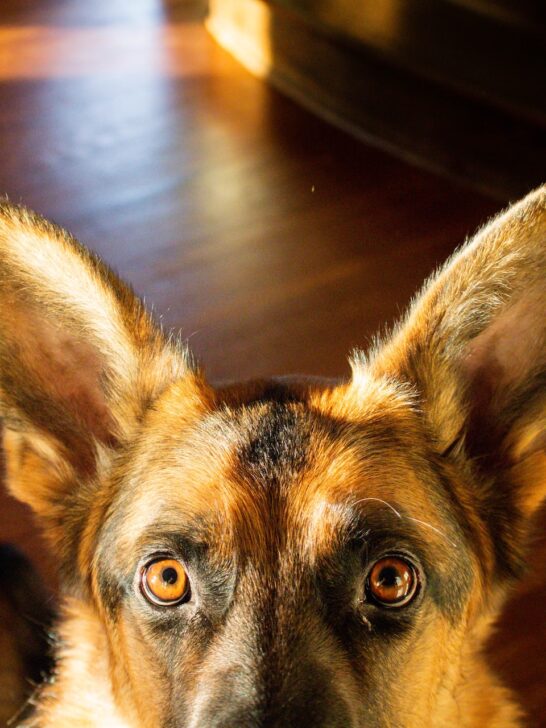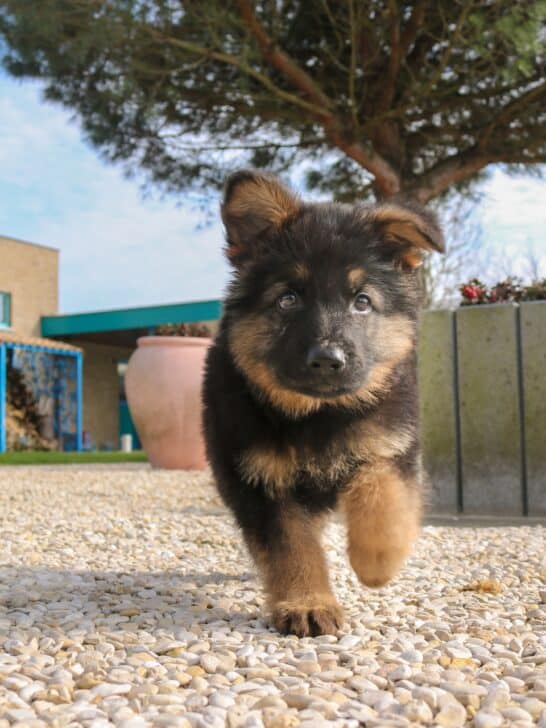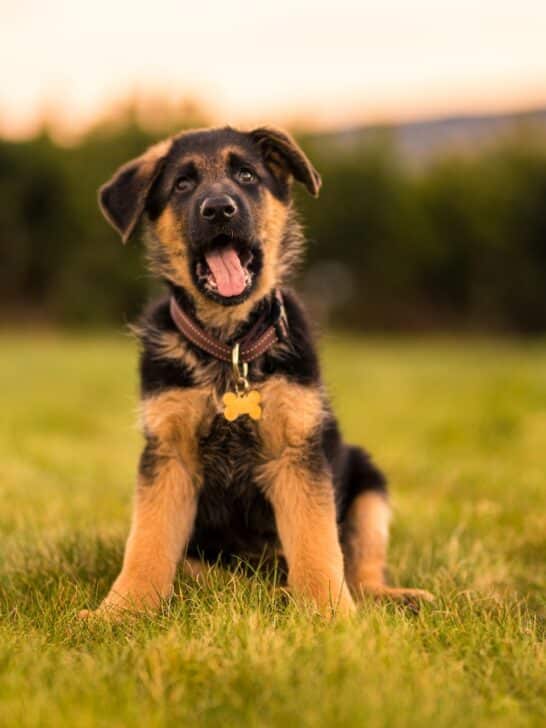How To Potty Train A German Shepherd Puppy: The Most Clever Tips
Have you ever considered bringing a puppy home for your son or daughter, but thoughts of training a young dog gave you pause? Which dog breeds come to mind when you think of difficulty potty training?
German Shepherds have a reputation for being easy to train. However, do you know exactly how to potty train a German Shepherd?
The German Shepherd is brilliant, and you can potty train her using three significant methods. Among the most effective means to house train German Shepherd puppies is using the versatility of the crate.
You can also use paper training with puppy pads or train directly to outdoor elimination via an ask at the door or a doggy exit.
Sometimes it is useful to teach German Shepherds to be able to urinate indoors on papers or outdoors in specific areas.
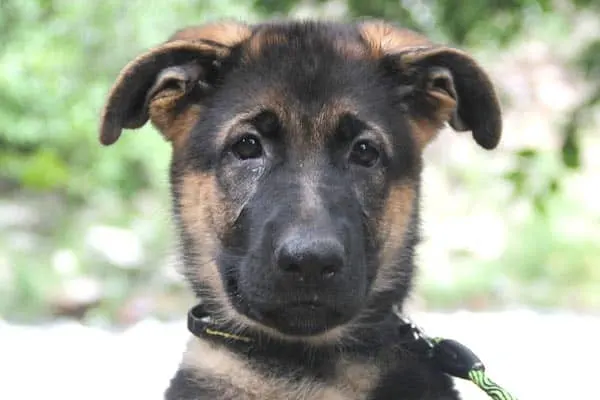
How easy are German Shepherds to potty train relative to other breeds?
When you picture dogs that are easy to housetrain, you probably think not only smart but also clean.
The German Shepherd is, of course, among the most intelligent dog breeds but also conscientious about not soiling themselves.
This combination of characteristics makes the Shepherd relatively easy to housetrain.
Five breeds make the top 10 easiest dogs housetrain according to both Melovemypet.com and cheatsheet.com.
- Bichon Frise
- German Shepherd
- Australian Shepherd
- Border Collie
- Doberman Pinscher
Poodles, Labradors, and certain Spitz breeds are also easy to potty train.
Some dog breeds are notable in how much they contrast with the German Shepherd when concerning house training. Toy breeds are particularly resistant to learning good bathroom habits.
- Yorkshire Terrier
- Jack Russell Terrier
- Afghan Hound
- Pomeranian
- Pug
You will note that herding dogs are consistently the easiest to potty train, while terriers show up often as the most difficult.
Many notoriously stubborn breeds like French Bulldogs, Bulldogs, and Chow Chows also can be difficult to train to go outside to do their business.
In contrast, certain dainty dogs such as the Chihuahua do not like to go out in the rain.
When will your German Shepherd stop having “accidents?”
Potty training your German Shepherd goes beyond intelligence, obedience, and natural cleanliness.
Like infants, a German Shepherd puppy must not only learn where it is acceptable to poop and pee but also must develop the ability to control her urinary bladder and large bowel physically.
Hopefully, you do not acquire a pup who is under eight weeks old, but if you do, he can only hold his urine for 30 minutes or less.
That does not mean he has to go every 30 minutes but that once he feels the urge, he has a half-hour window provided h
Per Puppyfaq.com, puppies over eight weeks of age can hold their pee and bowel movements for two hours and by the time they are four months old are capable of going twice that duration.
At six months of age, a German Shepherd can consistently go four or five hours without having to use the bathroom, gradually increasing the length of time between potty breaks to eight hours by a year old.
Your German Shepherd puppy will not have many accidents in the house if you stay vigilant in your supervision.
Expect quite a few mishaps at two months old when you first bring her home and full training with rare accidents at four to six months old.
Do not expect your Shepherd to go a full workday without getting relief until at least nine to twelve months old.
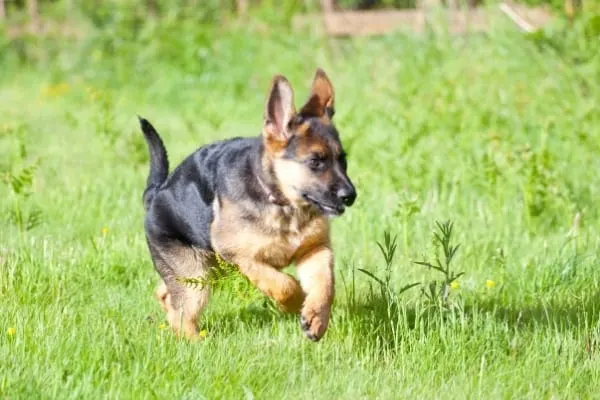
Establishing a bathroom ritual is crucial.
Ensuring you do everything the same at the same time each day will reinforce good bathroom habits for your puppy going forward into adulthood.
Many times when a puppy comes inside only to pee again after going outside, it is the result of incomplete training or the owner’s failure to allow the puppy enough time to finish his business.
You should work the times you take your puppy for a potty break after major events she will remember and begin to associate with elimination.
For example, eating usually stimulates a bowel movement some moments later. Take your puppy outside after any major meal.
With a young puppy that needs to go outside every few hours, try to be as consistent as possible on the times. German Shepherds are smart and will quickly associate particular times with peeing or pooping.
- First thing you do when you wake up
- After breakfast
- Between breakfast and lunch
- After lunch
- Between lunch and dinner
- After dinner
- Before bedtime
As your puppy becomes older and you feed him fewer meals, you will also be able to take him out for potty breaks less frequently.
Attention to time is important, but if you have a yard, training a specific area may also be desirable. Once you leash train your pup, you can keep her in the corner or patch you would like her to use.
You can even give her some leeway as many dogs will indicate a preference for a certain area of the yard.
Many people only have the goal that their dogs use the same corner consistently so they can keep the majority of the premises clean.
Isolated elimination protects walkways and flower beds and keeps lawns healthy.
The final part of your bathroom ritual with your German Shepherd puppy is one of the most important. Allow your puppy plenty of time to finish voiding, which in most cases, should be 15 to 20 minutes.
Sufficient time spent outdoors will help prevent bad habits such as “finishing” urinating indoors.
Avoid interrupting your puppy midstream, but be sure to praise him enthusiastically when he finishes. Praising during the act of urinating or defecating may distract your puppy, or worse, make him anxious.
What are some causes of inappropriate urination or defecation?
Occasionally, you may feel your puppy is having a few too many accidents in the house. Or perhaps your adult German Shepherd has started urinating in the house again.
Sometimes German Shepherds can have potty training issues crop up, but it is never a mistake to rule out any health concerns with a visit to your veterinarian.
Disorders that cause peeing in the house usually involve excessive thirst and corresponding urination.
Diabetes – Increased blood sugar levels can lead to poor water regulation by the kidneys.
A common presentation o diabetes in the German Shepherd is polydipsia (increased drinking) and polyuria (increased urination).
Liver disease can be inflammation, infection, or metabolic and may cause increased urination and drinking.
Renal (kidney) failure – When the kidneys initially lose function due to old age, for example, affected dogs will drink and urinate more. In chronic renal failure, dogs often exhibit a decrease in urination.
Steroid medication – Your dog may take prescription steroids for inflammation, and they cause increased drinking and urination.
Cushing’s disease – Cushing’s manifests similarly to a dog taking steroids, with increased thirst and urination a common symptom.
In the German Shepherd, Cushing’s disease may have as its cause a pituitary gland tumor at the base of the brain or an adrenal gland tumor near the kidneys.
Pyometra – usually a problem in older dogs, pyometra is an infection of the uterus in unspayed females that can have increased drinking and urination as a couple of its major signs.
Spaying your dog will eliminate the risk of pyometra.
Diuretics – Medications like Lasix will cause an increase in urination.
Enlarged prostate – Can cause straining and more frequent urination in male dogs. Neutering your German Shepherd will reduce risk factors for prostate enlargement.
Urinary tract infection – The discomfort of a UTI will cause more frequent urination and increased straining in your German Shepherd.
Females are more prone than males, and puppies may experience UTIs more often than adults. It may also indicate urinary bladder stones or a tumor.

What are the steps in the three potty-training methods?
The three different methods share many steps in common because the basic principals of potty training are the same.
- Consistency
- Repetition
- Reward
1. Create a schedule of preset times to take your puppy outside. Your schedule should correlate with 20 minutes after mealtimes and times in between that are appropriate for your pup’s age demands.
2. Connect your puppy’s leash to help you control where she goes.
3. When you take your puppy to do her business, pick her up, and carry her outside to her designated area.
Dogs learn where to toilet through sensors in their paws. You can train your dog to prefer grass, gravel, or shavings.
4. Keep your pup in her designated toilet area with the help of her leash until she has at least urinated. Give her 15 to 20 minutes.
5. Bowel movements will likely occur 10 to 30 minutes after a meal. Look for signs your puppy has to poop with additional and more focused sniffing.
When you see the additional sniffing, carry your puppy to her designated patch or corner.
6. Formulate a cue to encourage your pup to use the bathroom on command.
7. When your puppy finishes her business, reward, or praise her. Rewards can take the form of a treat, a show of affection, or access to a toy.
If you do not want your dog to become too food-oriented, vary your reward system.
8. When your puppy has used the toilet, allow her to frolic and play.
Immediately taking your pup inside after eliminating may teach her to associate her good behavior with the unwanted result of having to go back indoors.
9. Do not reprimand or punish your puppy before, during, or after peeing or pooping in an inappropriate place such as in the house.
Concentrate on positive reinforcement by rewarding desired skills and ignoring mistakes or behaviors you find objectionable.
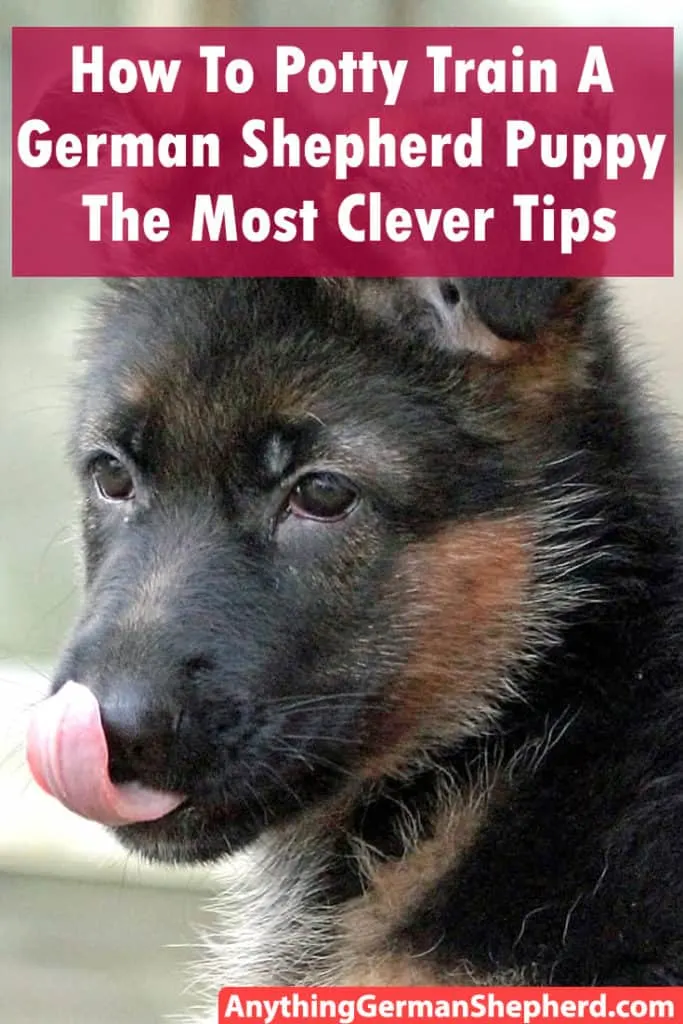
How do you potty train a German Shepherd without a crate?
In the “no crate” method, you allow your German Shepherd to have either limited access to the spaces in your home or free-range throughout the house.
If your German Shepherd pup can roam freely through your residence, it should follow that you will need to supervise him constantly.
Once your puppy becomes acclimated to your home, you will begin to notice even subtle signs he may need to relieve his bladder.
As you teach your pup a predictable routine, he will eventually start to go to the door to signal his need to go to the bathroom.
Puppies can also learn to use a dog door at a very early age. However, you want to be present when your puppy eliminates outdoors for a few reasons.
- Reinforce your pup’s designated area.
- Make sure your puppy is taking care of business and not just playing around.
- Praise your puppy to encourage desired behaviors.
Although you may not be using a crate, you can still confine your puppy to smaller areas with a baby gate or playpen. Enclosed spaces work well when you cannot watch your puppy during a certain time frame.
You can incorporate puppy pads at one end and resting area and water at the other.
How do puppy pads work for German Shepherds?
Many trainers advise not to use pee pads in training if you want your dog to use the bathroom outside.
You certainly want to train your Shepherd completely in eliminating outside before training on paper to avoid confusion.
However, puppy pads can be useful in several special circumstances.
- Incontinent older dog – Illnesses like degenerative myelopathy whereby your dog becomes debilitated and cannot control his bladder.
- Excessive urination – Your dog is PU/PD, and you cannot let her outside often enough.
- You have a very young puppy or a senior dog who cannot get outside much.
How do you use a crate to complement potty training?
Using a crate can speed up the process of housetraining your Shepherd. Crates embrace the premise that a puppy will instinctively not use the bathroom where she sleeps.
Puppies learn as soon as they can crawl that they must move outside the den to pee or poop. As they get older, they move further from the den to relieve themselves.
By cleaning behind them, wolves teach their pups that the den is no place for waste.
The key to an effective crate is that it must be small enough that a young puppy feels extremely uncomfortable using the bathroom in it. Even if it means dealing with some crying!
A crate should only allow a pup to lay down when using it for potty training. Some crates have a removable wall, while in other cases you have to keep buying new kennels as your dog grows.
You may have to train your German Shepherd to accept the crate.
Crate training involves discipline on your part and conditioning your puppy.
- Try never to allow your pup to void his bladder or bowels in the crate. Puppies can become accustomed to laying in filth and then become almost impossible to housetrain.
- Use the appropriate size kennel
- Do not use excess bedding
- If your pup has an accident in her crate, clean it up immediately.
























